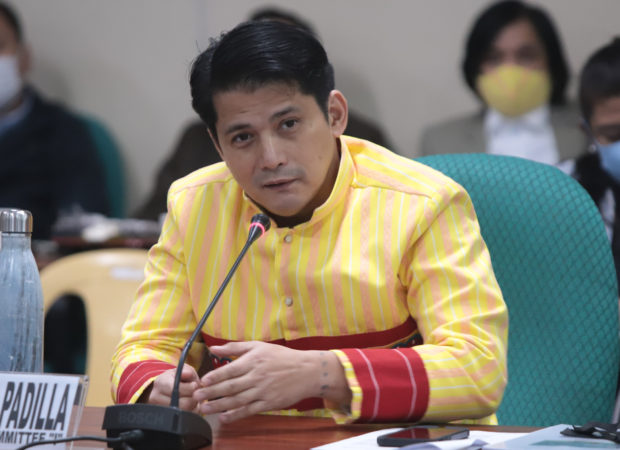Robin Padilla: Asking the President’s whereabouts is considered ‘national threat’

FILE PHOTO: Senator Robinhood Padilla during a hybrid hearing of the Senate on October 20, 2022. (Bibo Nuevaespaña/Senate PRIB)
MANILA, Philippines —A “national threat,” in Senator Robin Padilla’s eyes, might be defined as a request for information about the location of the President of the Philippines.”
Last month, the Twitter hashtag #NasaanAngPangulo (Where is the President?) trended when rumors spread that President Ferdinand Marcos Jr. had departed for Japan in the wake of the devastation wrought by Severe Tropical Storm Paeng (international name: Nalgae).
READ: Where’s the president? ‘Not in Japan,’ says Palace
According to Padilla, Marcos was with him in Cotabato during that time.
“Papaano ‘yun, wala ba kayong hakbang dun, Ma’am, sa mga fake news? Kasi lagi kong inaabangan kung ano ang sasabihin ng Office of the President kasi kasama ko si Presidente, nandun kami sa Cotabato noong panahon na ‘yun na ang tsinitsismis nasaan ang Pangulo,” the senator asked during Monday’s hearing in the Senate on fake news.
(How’s that, is there no action on that, Ma’am, on fake news? Because I have been waiting for the statement of the Office of the President because I was with the President, we were in Cotabato at that time when that rumor came out.)
“Eh sana tinanong ‘nyo ako kasi kasama ko. Wala po ba kayong hakbang dun? Katulad ng sinabi ng NBI (National Bureau of Investigation), para sa akin national issue ‘yun.”
(You should have asked me because we were together. Don’t you have any action on that? Like the NBI said, for me, that’s a national issue.)
After being asked about the office’s approach to press releases, OPS Undersecretary Rowena Reformina said they have been careful in their wording.
Padilla, who presided over the session as head of the Senate committee on public information and mass media, did not appear to be satisfied.
“Anong pwede nating gawin? Sinong pwedeng magreklamo dun kasi para sa akin national threat ‘yung ganun eh. Tinatanong mo kung nasaan ‘yung Presidente,” Padilla said.
(What can we do about it? Who can file a complaint because that’s a national threat to me? You’re asking where the President is?)
The head of the Department of Justice’s Office of Cybercrime, Angela Marie de Gracia-Cruz, gave a lengthy reply to the senator, enumerating other existing laws to combat the proliferation of fake news.
“So if you’re asking, Mr. Chair, if you have an existing legal framework that can address misinformation or disinformation, the answer is, yes, but the next question is are these laws sufficient? Based on the statements of the NBI and the PNP (Philippine National Police, maaaring sufficient naman po (it’s seemed sufficient nevertheless),” she said.
“Kasi, Ma’am, national interest ‘yung nangyari na ‘yun. Nalulungkot ako kasi walang nangyaring action,” Padilla said.
(Because, Ma’am, what happened is of national interest. I’m sad that no action has been taken.)
“Meron tayong very delicate issue sa BARMM (Bangsamoro Autonomous Region in Muslim Mindanao) and the national government. Sinasabi nitong mga nagpapakalat ng fake news na wala ang Presidente. ‘Yun ang kumalat,” he continued.
(We have a very delicate issue in the BARMM) and the national government. Those spreading fake news were saying the President was not around.)
According to Padilla, typhoon victims thought the president had abandoned them because of the lies they were hearing.
“Bakit walang aksyong legal galing sa ating gobyenro doon sa nagpakalat ng balita na ‘yun samantalang ‘yung balita na ‘yun, naapektuhan lahat ng nasa BARMM dahil ang akala nila, pinabayaan sila ng Pangulo ng Pilipinas,” the senator lamented.
(Why is there no legal action from our government against those who spread that news when it affected the people in the BARMM who thought the President had abandoned them.)
Since this falls under the Revised Penal Code, de Gracia-Cruz said anyone could file a case.
“Kahit sino pwedeng magkaso? Pwede bang NBI kaagad o PNP kagaad o ang Office of the Press Secretary? Hindi kelangan ang private complainant?” Padilla asked.
(Anyone can file a case? Can the NBI, the PNP, or the Office of the Press Secretary do it? There’s no need for a private complainant?)
“Kahit ako pwede akong mag-ano…kasi ginugulo nila ang peace talk?” he further asked to which de Gracia-Cruz answered, “Yes.”
(Even I can [file it] because they disturb the peace process?)
The issue was brought up after an officer of the NBI Cyber Crime, Efren Abantao, explained during the same hearing that there is already an existing law against fake news.
Abantao particularly cited Section 154 of the Revised Penal Code, which penalizes the spread of false news that endangers public order or causes damage to the interest of the state.
But the existing law against fake news is limited, Abantao admitted, adding that it would help to have a new measure that would expand or improve the definition of misinformation and disinformation while providing penalties for violators.
RELATED STORIES
Robredo is biggest disinformation victim; Marcos gains from ‘misleading’ posts — fact-checker
‘Fake news’ a problem in PH? 9 in 10 Filipinos agree, says Pulse Asia